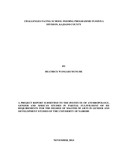| dc.description.abstract | The purpose of the study was to assess the challenges of the school feeding programme in
Kajiado County. Specifically, the study examined the impact of accessibility on the smooth
running of the school feeding programme; the effects of sustainability on the school feeding
programme; and to establish the management challenges to SFP arising from increased
enrollment of pupils in the beneficiary schools in Kajiado County. The study employed a
descriptive survey design to explore the challenges facing school feeding programme in
Kajiado County. Sampling was conducted in two stages. In the first stage, purposive
sampling method was used in selection of the sample schools, while in the second stage the
same technique was used in selection of the respondents / informants. All the head teachers
(or deputies) and SFP managers from the 49 schools under SFP programme from Isinya
Division were interviewed while five schools were purposively selected for the focus group
discussions. Seven schools were excluded from the final sample tally due to inaccessibility
and hostility. Survey data was conducted from 42 primary schools from within Isinya
Division. The respondents were head teachers, SFP managers, education officers, as well as
SFP programme managers from WFP.
The study found that the current state of infrastructure within and outside the beneficiary
schools has hindered the extent to which the beneficiaries are able to access the benefits of
the SFP. The other findings showed that ranking top on hinderance to accessibility is: lack of
tarmacked roads; inaccessibility to clean drinking water sources; and lack of permanent
dwelling structures within the schools. Secondly, the findings showed that the schools
reliance on external support (donors and the government) is extremely high. This is in
comparison to the support that the schools and the communities ought to be providing to
come up with long lasting solutions geared towards sustainability of the SFPs. In all the
schools visited, it was evident that the donors and the government contribute most of the
resources required in running the SFPs, with very little being drawn from the local
communities (mainly the parents). Finally, the findings showed that increased enrollment as a
result of the introduction of free primary education and the SFP had significantly constrained
the capacity of schools to adequately manage the meals programmes. In conclusion, the study
shows that the challenges facing the implementation of SFPs are diverse. The deficiencies
from state actors in terms of policy formulation and implementation emerged that the major
sources of challenges facing the implementation of the community. Of great importance also
is the role played by the communities in ensuring that the programmes are running on day to
day basis. The study recommends the need for the government to address food security needs
for pastoralist communities; the need to revamp the policy framework detailing the
management of SFP; and the need to improve on the physical infrastructure so that the target
beneficiary schools can be accessed with ease. | en_US |

